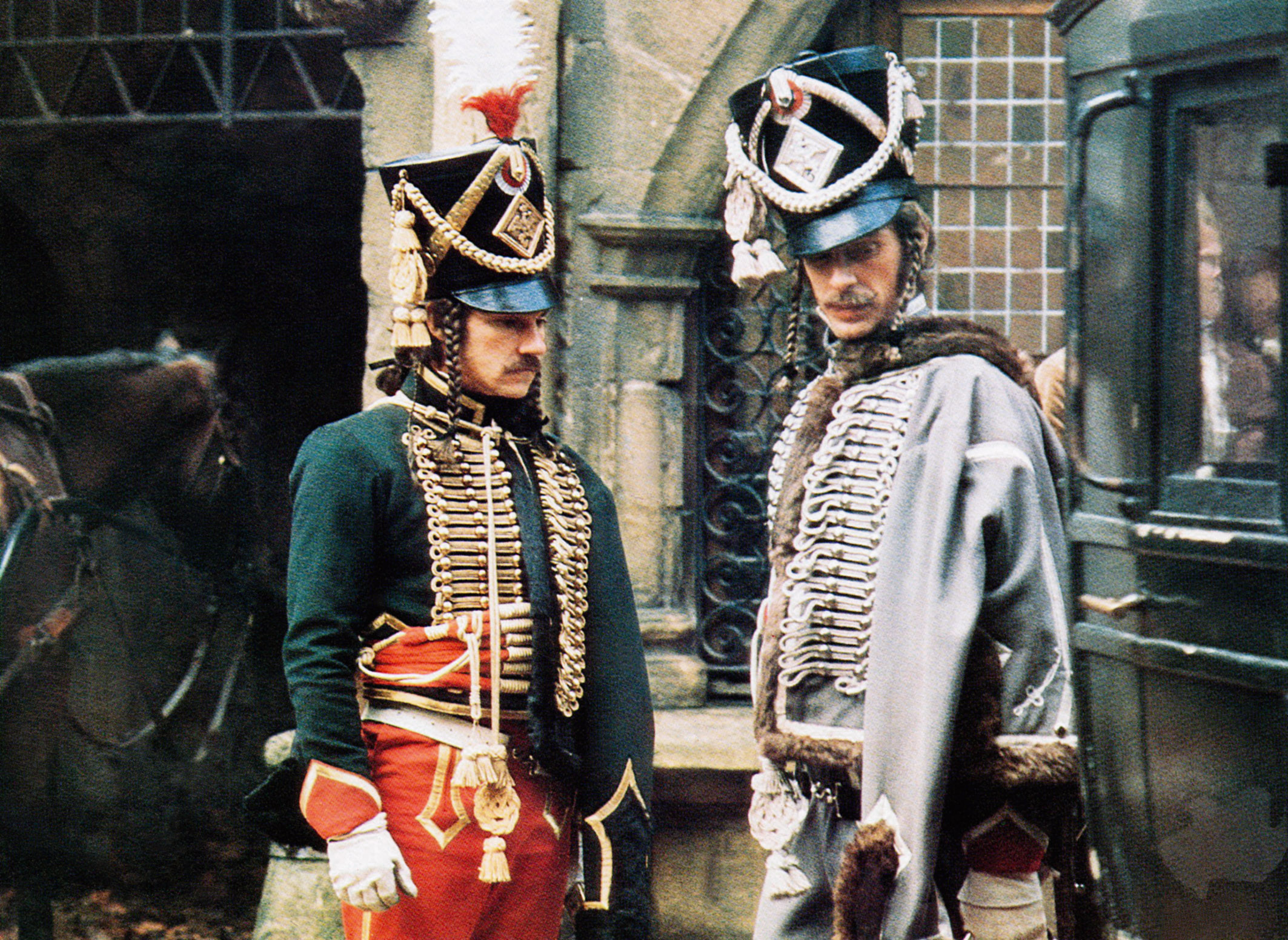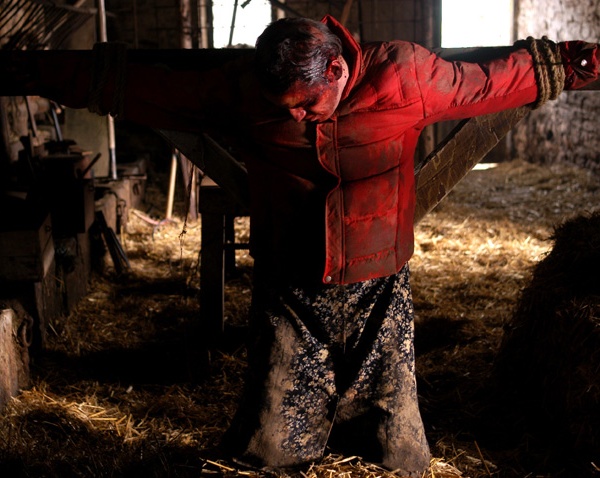Ridley Scott‘s wildly ambitious “Napoleon” might be the director’s last word on its subject, but it’s not the first time he tackled both the glory and the absurdity of the Napoleonic era. One could say that “Napoleon” has been 46 years in the making, since Scott first began thinking about and researching the French emperor during the making of his debut feature, “The Duellists,” in 1977. That film tells the story of two officers (Keith Carradine and Harvey Keitel) in Napoleon’s army who engage in an obsessive ritual of duels that goes on for so long that they ultimately forget what even started the grievance; in its setting, visual style, and themes, it’s an exceptionally well-realized template for most of the Ridley Scott epics that would follow — and he shot this historical extravaganza on a budget of around $800,000.
By the time Scott made “The Duellists,” he had spent 15 years directing commercials — well over a thousand by his count — and thus had plenty of time on set to develop the chops that would enable him to create a masterpiece with his inaugural feature. Knowing he’d have to pay a screenwriter, Scott saved money by turning to public domain stories and novels for ideas, ultimately finding his subject in Joseph Conrad’s short story about a minor offense that sets off a years-long obsession.
Scott returned to the subject again and again in his career, up to and including “Napoleon.” While the broad subject is war, what makes “The Duellists” and the director’s later meditations on the topic interesting is the uniquely idiosyncratic point of view; Scott is obsessed with military procedure and ritual and presents it in rigorous detail even while poking fun at or scathingly indicting the idiocy of men at war and in power. One of the interesting dichotomies in Scott’s work is that he’s often preoccupied with masculine worlds and energies but doesn’t seem impressed by them — the women tend to be the stronger figures in his movies, which are populated by men whose unjustified confidence yields either laughs or tragedy depending on the genre.

Scott’s non-combat pictures like “Alien,” “Blade Runner,” “Thelma and Louise,” and “The Counselor” are filled with men who, are at best, ineffectual and silly and at worst deeply destructive. In the war movies , the men tend to be both absurd and destructive; “Napoleon” is one of Scott’s great satires on masculinity in the way it presents a deeply insecure man whose neuroses combine with a strategist’s mind to wreak havoc on history. Even in a conventionally heroic war film like “Black Hawk Down,” Scott’s overall point of view on combat is bleak — there’s never any real point to war in his movies outside of the aesthetic pleasures it provides for his camera.
“The Duellists” is one of Scott’s purest expressions of male folly in its endless cycle of violence that has no motivating factor other than one man’s bruised ego; it also looks forward to a dynamic that appears again and again in Scott’s work, that of arrogant, sense-impaired men and the stronger, smarter women forced to endure them. Although there are few female characters in “The Duellists,” there’s a pointed exchange that Scott would develop throughout his career when Keitel’s character is approached by his rival’s lover and says, “I knew a man who was stabbed to death by a woman…it gave him the surprise of her life.” The lover’s response — “I once knew a woman who was beaten to death by a man. I don’t think it surprised her at all” — provides one of the film’s best lines and feels like it could have been right out of other Scott films like “Thelma and Louise,” “G.I. Jane,” and “The Last Duel.”
Many directors’ first films hint at ideas and stylistic tropes that they will develop further — Kathryn Bigelow’s “The Loveless,” Quentin Tarantino’s “Reservoir Dogs,” and Paul Thomas Anderson’s “Hard Eight” are obvious examples — but what distinguishes “The Duellists” is how fully formed Scott’s voice already is. Bigelow, Tarantino, and Anderson all needed expanded resources and canvases to really show what they could do (and all created classics with their follow-up features), but “The Duellists” feels like a movie that could have been made at any point in Scott’s career. There’s no sense of a director being limited by a lower budget; in fact, those limited resources dictated a visual style that characterizes Scott’s later films even when he had hundreds of millions of dollars at his disposal.

Because he had no money to build sets, Scott shot “the movie”The Duellists” in parts of France, England, and the Scottish Highlands that had existing structures that could serve as period locations. When he needed to hide modern decor or camera equipment, the crew draped white sheets over everything, a solution that gave the movie a haunting, dreamy quality that Scott recreated on much more elaborate productions like “1492” and “Hannibal.”
Whether it was dictated by finances, aesthetic preference, or both, “The Duellists” also firmly established the lighting style of Scott’s films; without an abundance of lights and equipment to evenly illuminate his frames, Scott used one strong light source throughout “The Duellists,” letting the light fall off into darkness around his actors in a manner that serves several functions. It creates a sense of painterly modeling that’s pleasing to the eye, it hides the fact that Scott couldn’t afford excessive extras or large sets, and it allows him to create striking images no matter where he places his camera. This last point would become key from “Black Hawk Dawn” on, as Scott started to use 11 or more cameras to capture his increasingly complex action sequences — an approach that only works with minimal lighting.
Although Scott was only able to carry one camera on “The Duellists,” whereas now he works with a minimum of four even on straightforward dialogue scenes, the film’s overall look is strikingly similar to “Napoleon” at times. “The Duellists” is filled with ravishing images and rigorously authentic costumes that are all the more impressive given its $800,000 budget. But Scott made the most of that money, finding ways to marry fiscal responsibility to artistic impulses to avoid being on the hook if the movie went south (to secure a completion bond, he was effectively his own insurance company). Sadly, “The Duellists” didn’t find a large audience when it came out in 1977; in America, Paramount only struck seven prints that played to mostly empty theaters. Fortunately for Scott, among the few who saw the movie were “Alien” producers David Giler and Walter Hill; something told them that the director of this low-budget period piece might just be the right helmer for their nasty little horror film, and the rest is history.
Stream “The Duellists” for free on Pluto TV.







